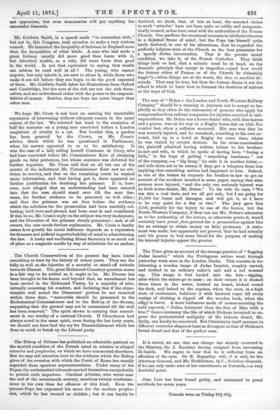The Bishop of Orleans has published an admirable pastoral on
the morbid condition of the French mind in relation to alleged miracles and prophecies, on which we have commented elsewhere. But we may call attention here to the evidence which the Bishop gives of the aversion with which the Court of Rome has usually regarded these spurious supernaturalism. Under many of the Popes, the ecclesiastical tribunals exerted themselves energetically to punish such impostors. Cardinal Albitino, who wrote near the end of the seventeenth century, mentions twenty condemna- tions in his own time for offences of this kind. Even the present Pope has expressed his scorn for the modern prophe- cies, which he has treated as childish ; but it can hardly be
doubted, we think, that, of late at least, the asserted claims to work miracles' have not been quite so coldly and antagonis- tically treated, as has been usual with the authorities of the Roman Church. One pardons the occasional recourse to artificial stimulus in a dejected frame of mind ; but the Pope has himself quite lately declared, in one of his allocutions, that he regarded the perfectly helpless state of the Church as the best guarantee for a speedy divine intervention. That is the precise moral condition, we take it, of the French Catholics. They think things look so bad, that a miracle must be at hand, on the dramatic principle that except in tragedies,—(and how could the history either of France or of the Church be ultimately- tragic ?)—when things are at the worst, the dens ex machind de- scends. That may be true, but then the human drama is not the school in which to learn how to forecast the destinies of nations or the ways of God.


































 Previous page
Previous page